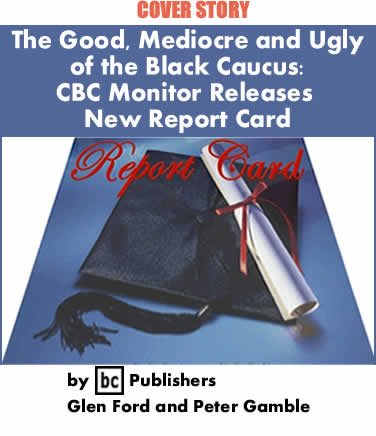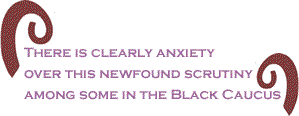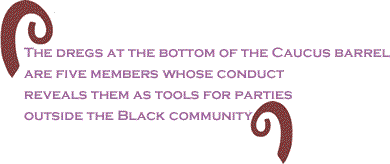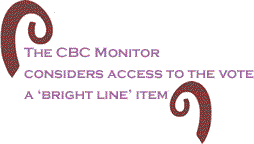
|
|||||||||||||||||||||
 |
|
|
The second biannual Congressional Black Caucus Monitor Report Card shows that a handful of "derelicts" in the CBC remain far outside of the African American political consensus - worthless to the Black constituents that voted them into office. Yet 81 percent of the 42 African American House members (34) scored 80 percent or higher on the watchdog group's index of "bright line" issues, evidence that the corporate-financed rot that became dramatically manifest in 2005 has not infected most of a caucus that has long claimed to be "the conscience of the congress." "CBC Monitor is a challenge both to the CBC themselves but also Black America to get more active in making the American political system function in its benefit," said Jared Ball, a founder of the CBC Monitor. "Our report cards are just that: scheduled, timely assessments meant to criticize and reward performance." ‘Somebody's watching you…' At the top of the Honor Society, with perfect scores in both the first and second halves of the 109th Congress, were: John Conyers (MI), Barbara Lee (CA), John Lewis (GA), Cynthia McKinney (GA), Eleanor Holmes Norton (DC), Charles Rangel (NY), Robert Scott (VA), and Maxine Waters (CA). They are the most brightly shining lights of progressivism in the CBC.
Fourteen other members registered an "A" on the CBC Monitor scale, with scores of 90 to 95: Donna Christian-Christensen (VI), Chaka Fattah (PA), Eddie Bernice Johnson (TX), Major Owens (NY), Stephanie Tubbs-Jones (OH), Diane Watson (CA), Melvin Watt (NC), Emanuel Cleaver (MO), Al Green (TX), Julia Carson (IN), William "Lacy" Clay (MO), James Clyburn (SC), and Carolyn Kilpatrick (MI). However, despite their 95% combined Spring-Fall scores, Reps. Cleaver and Green were denied Honor Society status because of their votes for the GOP's infamous Bankruptcy bill, in the Spring of 2005 - a cardinal sin, by the CBC Monitor's reckoning (and BC's, too). Grouped like dregs at the bottom of the Caucus barrel are five members whose conduct reveals them as tools for parties outside the Black community: Albert Wynn (MD) 55%, Artur Davis (AL) 40%, David Scott (GA) 35%, Sanford Bishop (GA) 32.5%, and Harold Ford Jr. (TN) 32.5. Ford was also the lowest rated congressperson in the CBC Monitor's September, 2005 Report Card (at 5%). However, perhaps looking over his shoulder at his base as he runs for the U.S. Senate this year, Ford improved his Fall score by 55 points over his abysmal Spring tally. But he remains a "Derelict" of the worst order. All five "Derelicts" are members of the Democratic Leadership Council (DLC) and/or Blue Dog Democrats.
The hapless three members rated "Underachievers" by the CBC Monitor, are: G.K. Butterfield (NC) 75% "C", William Jefferson (LA) 70% "C", and Gregory Meeks (NY) 65% "D." Meeks and Jefferson climbed out of their earlier "Derelict" status in the second half of the session, but Butterfield managed to slime his way downward from a previous "A" - the worst showing of any newcomer to the CBC. (U.S. Senator Barack Obama (D-IL) was not included in the second CBC Monitor Report Card, because no corresponding "bright line" issues came up in his chamber of Congress in the latter part of the year. He retains his earlier grade of "C" - an "Underachiever.") ‘Every step you take, every move you make…' "Many if not most of the Caucus never expected a group of African Americans to call them on their own performances," said the CBC Monitor's Leutisha Stills. Among those who might be most surprised by their "B" scores (80-89%) may be 5 of the 12 congresspersons who lost points for voting in favor of a bill that would bar non-governmental organizations (NGOs) from using public housing project offices for voter registration activities.
The 39 CBC members who cast votes on the Federal Housing Reform Act split, 27 to 12, over a provision prohibiting participation by non-profit housing agencies in voter registration and other non-partisan electoral activities. Unlike most points of contention in the Caucus, support for this provision of an otherwise popular bill cut across ideological lines. All three members of the usually progressive Black Chicago delegation (Danny Davis, Bobby Rush, and Jesse Jackson Jr.) voted to keep non-profit voter registration activists out of public housing project offices, as did Bennie Thompson (MS), Elijah Cummings (MD), Gwen Moore (WI), Corrine Brown (FL), the underachieving William Jefferson (LA) and G.K. Butterfield (NC), and derelicts Artur Davis (AL), Albert Wynn (MD), and Harold Ford Jr. Sanford Bishop (GA), a derelict, failed to vote, which the CBC Monitor counted as amounting to a vote in favor of the successful GOP-led provision. It seems apparent that some CBC members' decisions on public housing voter registration activity were based on local exigencies - who was organizing against whom - in their districts. However, the CBC Monitor explained to The Black Commentator that it considers access to the vote a "bright line" item, and the more the better. It should also be noted that none of the "Honor Society" CBC members voted to exclude NGOs from public housing offices. (At the same time, a number of B-rated legislators would have been ranked among the "Honor Society" had they voted differently on the public housing measure.) Nevertheless, the CBC Monitor is open to argument from congresspersons who believe they have gotten a raw deal, or that the motivation for their vote was misunderstood. "Where furthering our issues in congress is challenging for the Caucus, we hope that our work will encourage our representatives to express any challenges being faced to their constituents, to dialogue and garner grassroots support there in order to raise their voices in Congress," said Suzette Gardner, a CBC Monitor founder. "Representing our interest in Congress is not a one-man/woman show and that is the point of our efforts here at CBC Monitor."
To date, only U.S. Virgin Islands Delegate Donna Christian-Christiansen (Honor Society, "A") has responded in detail to CBC Monitor's queries about bills their offices were attempting to push through committee. Eyeballing Our Representatives
The CBC Monitor was created in the wake of a disastrous performance by more than a third of the Congressional Black Caucus in the first half of 2005. In what less than a decade ago would have been unthinkable, 15 members - 37 percent of the Caucus - voted for one or more GOP bills on Bankruptcy, the Estate Tax, and Energy, with vastly harmful effects on the Black community. As BC wrote in our April 28, 2005 Cover Story:
The CBC Monitor is a mechanism to identify and isolate the worst-of-the-worst - the "Derelicts" of the Caucus - and to encourage "our better angels" on the majority, progressive side of the Caucus to keep-on-keepin'-on, despite corporate blandishments. The rot in the CBC is a direct result of an offensive by the Right - which became dramatically evident in the 2002 election cycle - to subvert Black Democratic politics from within in an attempt to create out of whole cloth a "New Black Leadership." This offensive is a bi-partisan affair, with the corporate-vetted Democratic Leadership Council in the vanguard. The Congressional Black Caucus has been infested by the DLC (that's where the "Derelicts" come from) making it impossible for the Caucus to operate in its traditional manner - through consensus. Yet the progressive majority of the Caucus has so far failed to come to grips with this treacherous phenomenon. Thus, the CBC cannot take positions as a body on issues in which the DLC holds an effective veto power. Black politics at the national legislative level has been, in a critical sense, neutered. It required such a shock to motivate the founders of the watchdog CBC Monitor to demand accountability from each Black member of Congress - something that, in hindsight, should have been done long ago, and must be replicated at every level of government. The CBC Monitor's choice of "bright line" issues is based on the historical Black Consensus in favor of social justice, democratic rights, human equality, and peace. None should fear such standards. But there is clearly anxiety over this newfound scrutiny among some in the Black Caucus. BC recounted an incident at the September Congressional Black Caucus Weekend activities, in Washington, when the first CBC Monitor Report Card was released:
Not only the Caucus, but the Black polity at-large must get used to a new era, when outside forces have thoroughly infiltrated our institutions, requiring constant vigilance by community watchdogs. Congressman Watt is, based on his record ("A"), one of the good guys, but the times dictate that no Black institution be immune to scrutiny. "Some of our critics have said that by publishing these report cards we are ignoring the minority status of the CBC in Congress and their limited power," said the CBC Monitor's Suzette Gardner. "I'd like to use this opportunity to let those critics know that we are aware of the status of the CBC in Congress."
The CBC irritated some of the Caucus by refusing to base its ratings solely on traditional "civil rights" legislation. The September Report Card graded lawmakers on nine bills: Iraq War Authorization; Bankruptcy Reform bill; CAFTA; Gang Deterrence bill; Watt Amendment to the Federal Budget; Class action (Tort Reform) legislation; Estate Tax repeal Legislation; REAL ID Act (voting rights); and the Energy bill/Capps Amendment. The current Report Card rates CBC performance based on five pieces of legislation: Rep. Murtha's motion prohibiting torture; Federal Housing Reform Act; a second Energy bill; Patriot Act; and a bill to protect gun manufacturers, dealers and distributors from legal liability. The CBC Monitor exists because this juncture in history demands it. Never before has a Black organization graded Black politicians on their service to the Black polity, on the basis of the Black Political Consensus, rather than on some "curve" that includes the legislative records of far-right Arizona Republicans - a construct that would allow even the most "Derelict" Black politicians to shine by comparison. The CBC Monitor grades Black politicians on a Black political scale, on issues that affect the masses of Black people - as it should be. The popular response has been overwhelmingly positive. "After issuing our first Report Card" in September, Suzette Gardner told BC, "we were greatly encouraged by the response. I'd say about 90 percent of readers were like, ‘right on, its about time!'" Jared Ball, a PhD in journalism who teaches at the University of Maryland, puts it this way:
Leutisha Stills, a longtime activist in Black politics who outlined the CBC Monitor Report Card methodology in BC's December 22, 2005 issue, notes that there are "at least five renegade members of the Caucus who vote against the interests of the Black community with impunity. They think they can continue this behavior without reprisals. They are wrong." A Black Progressive PAC to finance challengers to the worst performers among the Congressional Black Caucus, called for in the May 12, 2005 issue of The Black Commentator, has been established. Beware, "Derelicts." Righteous Black folks are out to topple you. The CBC Monitor's website is http://cbcmonitor.voxunion.com. The Black Progressive PAC is now officially in existence. E -mail [email protected] for more information. BC Publishers Glen Ford and Peter Gamble are writing a book to be titled, Barack Obama and the Crisis in Black Leadership. |
|
| Home | |
Your comments are always welcome. Visit the Contact Us page to send e-Mail or Feedback or Click here to send e-Mail to [email protected] e-Mail re-print notice
If you send us an e-Mail message we may publish all or part of it, unless you tell us it is not for publication. You may also request that we withhold your name. Thank you very much for your readership. |
|
| February 2, 2006 Issue 169 |
||||||||||||||
|
||||||||||||||
|
||||||||||||||
| Printer Friendly Version in Plain Text or PDF format. Download free Adobe Reader. | ||||||||||||||
 |
||||||||||||||
 |
||||||||||||||
 |
||||||||||||||
| |
||||||||||||||
| |
||||||||||||||

































